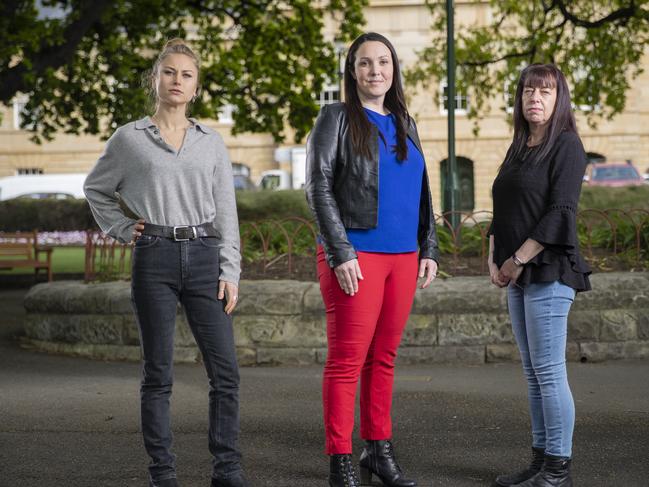Sexual assault survivors finally win right to speak but say changes are not perfect
Tasmanian sexual assault have welcomed the passage of legislation allowing them to tell their stories, but they say there are still improvements to be made.

Police & Courts
Don't miss out on the headlines from Police & Courts. Followed categories will be added to My News.
LEGISLATION has passed through Tasmania’s Upper House of parliament this week which will allow more sexual assault survivors to speak out under their own names following community pressure from the Let Her Speak campaign.
Tasmania’s Attorney-General Elise Archer has praised the “enormous bravery” of survivors in pushing for reform and said the new legislation will allow victims to speak out “more readily” if that is what they want.
Under the new law, sexual assault victims will be able to use their real name if they are over 18, provide consent to be named in writing, have not been coerced into agreement, and have the capacity to consent.
However, sexual assault victims will remain fully gagged until all possible avenues of appeal have been exhausted – a process critics say can continue for years after a guilty verdict is handed down.
During that process, perpetrators will remain free to speak, however victims will need to apply for a court order if they wish to do the same. They will also need to cover out of pocket costs to engage a lawyer, however court costs will now be waived.
In no other crime in Tasmania are victims required to obtain a court order to use their own name. The new law will also place Tasmania at odds with the majority of other Australian jurisdictions who do not gag sexual assault victims during appeals.
Grace Tame, who fought to become Tasmania’s first female sexual assault survivor to win the right to self identify, said “some details of the Bill require further attention and revision”.
“Although this is certainly a cause for celebration and an encouraging step in the right direction, it is not a conclusive victory,” she said.
“If we are going to make a permanent change to our justice system, which in turn will have a lasting social and cultural impact, we need to ensure that it is airtight. There must be no ambiguity.”

Ms Tame became the face of the Let Her Speak campaign after discovering she could not speak out under her real name, or respond to her offender, Nicolaas Bester, who had boasted about his crimes on Facebook and was later given a sympathetic interview with conservative commentator Bettina Arndt.
Under the new legislation, a person in Ms Tame’s position would still be required to apply for a court order to use her real name so long as the offender continued to appeal the conviction or convictions.
Gina McWilliams, senior legal counsel for News Corp Australia, said she is “disappointed that the opportunity to make a lasting and effective change has been missed”.
“We will continue working towards further amendments to enable all survivors to have a complete voice instead of one which is hamstrung,” she said.
Ms McWilliams said the Bill put publishers in an “untenable position” as they can still be prosecuted for revealing the identities of survivors who wish to be named prior to all proceedings being disposed of.
“From the survivor’s perspective, it’s the same problem but even worse,” said Ms McWilliams. “They are not only facing the commission of a possible offence [for publishing their own name], they are being denied the opportunity to own their own story until some unknown date in the future where no further proceedings could possibly occur.
“That could be short term, or very long term.”
Ms Tame said she was grateful for the work to date, and will continue to push for reforms.
“The Let Her Speak campaign has been characterised by patience, perseverance, and thorough work. We are no strangers to waiting. Nothing worth doing is easy, nor implemented in a rushed manner,” she said.
Nina Funnell is the creator of the Let Her Speak campaign in partnership with News Corp, End Rape On Campus Australia and Marque Lawyers.


